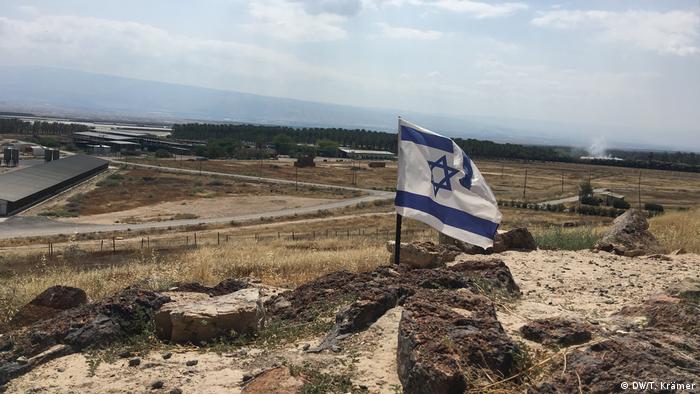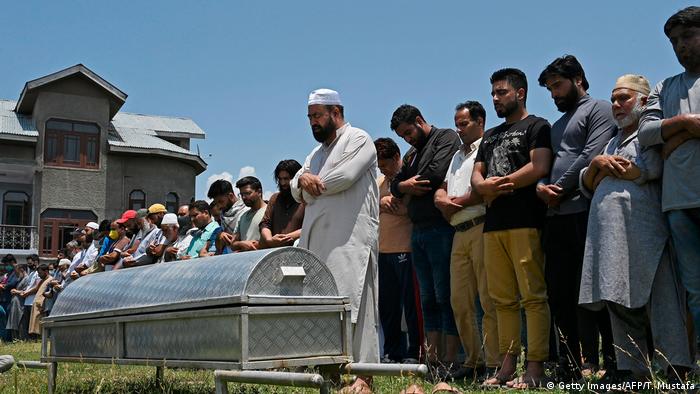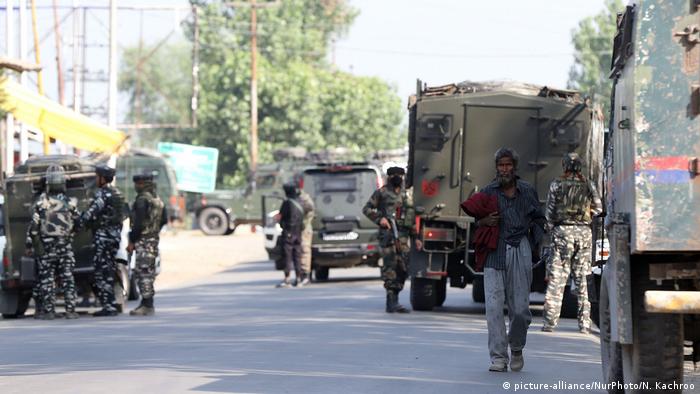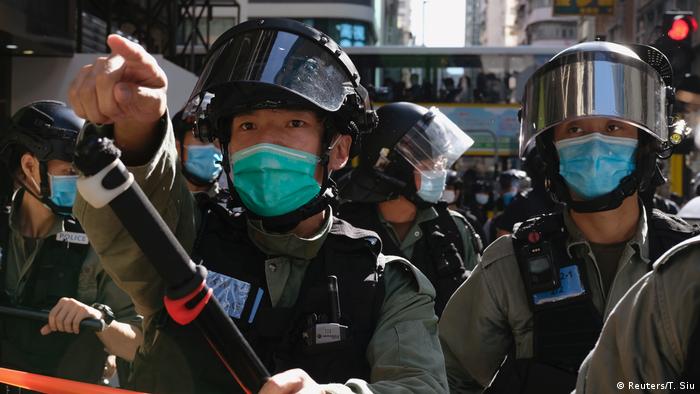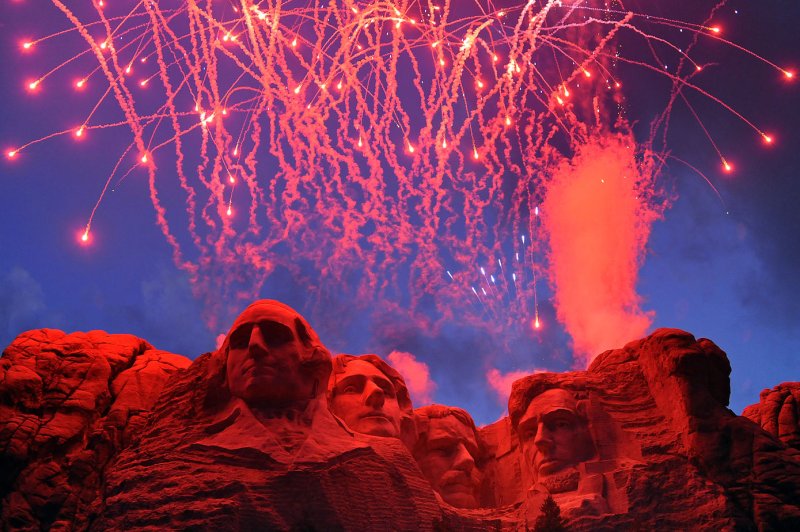Issued on: 01/07/2020

A Palestinian man wears a mask during a rally against Israel's West Bank annexation plans in the Jordan Valley village of Bardala on June 27, 2020. © Jaafat Ashtiyeh, AFP
Text by:FRANCE 24
Thousands of Palestinians protested in Gaza on Wednesday against Israel's plans to annex parts of the West Bank, where Palestinian authorities announced a new five-day lockdown amid a worrying resurgence of the coronavirus.
Israel's centre-right coalition government had set July 1 as the date from which it could begin implementing US President Donald Trump's Middle East peace proposal.
While no major announcement was expected on the kick-off date, the office of Israeli Prime Minister Benjamin Netanyahu said talks with US officials "were continuing on the application of sovereignty".
Netanyahu was also discussing annexation with his security chiefs, it added, noting that "further discussions will be held in the coming days".
In Gaza City, several thousand protesters gathered, some brandishing Palestinian flags and placards condemning Trump at a rally.
"The resistance must be revived," Gaza protester Rafeeq Inaiah told AFP. "Israel is afraid of force."
Smaller demonstrations were held in the West Bank cities of Ramallah and Jericho, attended by a handful of left-wing Israeli politicians opposed to annexation.
"We want to affirm our support for peace," former Labour party official Ophir Pines-Paz told AFP.
The Trump plan, unveiled in January, offered a path for Israel to annex territory and Jewish West Bank settlements, communities considered illegal under international law.
Netanyahu supports the Trump plan – which has been roundly rejected by the Palestinians – but the right-wing premier has not laid out his intentions for enacting the US proposals.
Hamas, the Islamist group that controls Gaza, fired some 20 rockets from the coastal Palestinian enclave into the Mediterranean Sea on Wednesday, a move aimed at dissuading Israel from moving forward, Hamas sources told AFP.
Hamas, which has fought three wars with Israel since 2008, says that Israeli annexations in the West Bank, which borders Jordan, would be a "declaration of war".
Growing global opposition
France's foreign minister said on Wednesday that any Israeli annexation in the occupied West Bank would be in violation of international law and would have consequences.
"Annexation of Palestinian territories, whatever the perimeters, would seriously throw into question the parameters to resolve the conflict," Jean-Yves Le Drian told a parliamentary hearing.
"An annexation decision could not be left without consequences and we are examining different options at a national level and also in coordination with our main European partners," he added.
Writing in Israel's Yedioth Ahronoth newspaper on Wednesday, Britain's Prime Minister Boris Johnson said that although he was a "passionate defender of Israel", he viewed annexation as "contrary to Israel's own long-term interests."
"Annexation would represent a violation of international law," he said.
Australia, in a rare criticism of Israel, warned against "unilateral annexation or change in status of territory on the West Bank".
Most European states and the United Nations oppose annexation, as do Gulf Arab states, with which Israel has increasingly sought warmer ties.
Jordan, one of only two Arab nations that has diplomatic ties with Israel, has warned that annexation could trigger a "massive conflict" and has not ruled out reviewing its 1994 peace treaty with the Jewish state.
Amnesty International's deputy Middle East chief Saleh Hijazi said: "International law is crystal clear on this matter – annexation is unlawful", adding that if Israel moves forward it "points to the 'law of the jungle.'".
Covid-19 second wave
Israel's defence minister and alternate prime minister Benny Gantz has said annexation must wait until the coronavirus crisis has been contained, amid a sharp spike in new Israeli and Palestinian cases.
The Palestinian Authority on Wednesday announced a five-day lockdown across the West Bank after total confirmed coronavirus infections in the territory more than doubled following the easing of previous restrictions.
"Starting from Friday morning, all governorates of the West Bank... will be closed for a period of five days," government spokesman Ibrahim Melhem said, adding that pharmacies, bakeries and supermarkets were exempt.
The latest data from the Palestinian ministry of health said that as of Wednesday morning, a total of 2,636 people had tested positive for Covid-19 since the illness was first recorded in the West Bank, compared with just 1,256 a week ago.
Last week, after the easing of a previous coronavirus lockdown in late May, Palestinian health minister Mai al-Kaila said the territory had entered a second wave of infections "more dangerous than the first".
Most infections were traceable to Palestinians working in Israel or Arab Israeli visitors to the West Bank, Kaila said.
There have been seven deaths from the virus in the territory.
Israel has also recorded a surge, with 25,547 confirmed cases on Wednesday morning, up around 15 percent from a week earlier.
The Palestinian Authority imposed a full West Bank lockdown after the first coronavirus cases were identified on 5 March, lifting it at the end of May.
(FRANCE 24 with AFP)
"The resistance must be revived," Gaza protester Rafeeq Inaiah told AFP. "Israel is afraid of force."
Smaller demonstrations were held in the West Bank cities of Ramallah and Jericho, attended by a handful of left-wing Israeli politicians opposed to annexation.
"We want to affirm our support for peace," former Labour party official Ophir Pines-Paz told AFP.
The Trump plan, unveiled in January, offered a path for Israel to annex territory and Jewish West Bank settlements, communities considered illegal under international law.
Netanyahu supports the Trump plan – which has been roundly rejected by the Palestinians – but the right-wing premier has not laid out his intentions for enacting the US proposals.
Hamas, the Islamist group that controls Gaza, fired some 20 rockets from the coastal Palestinian enclave into the Mediterranean Sea on Wednesday, a move aimed at dissuading Israel from moving forward, Hamas sources told AFP.
Hamas, which has fought three wars with Israel since 2008, says that Israeli annexations in the West Bank, which borders Jordan, would be a "declaration of war".
Growing global opposition
France's foreign minister said on Wednesday that any Israeli annexation in the occupied West Bank would be in violation of international law and would have consequences.
"Annexation of Palestinian territories, whatever the perimeters, would seriously throw into question the parameters to resolve the conflict," Jean-Yves Le Drian told a parliamentary hearing.
"An annexation decision could not be left without consequences and we are examining different options at a national level and also in coordination with our main European partners," he added.
Writing in Israel's Yedioth Ahronoth newspaper on Wednesday, Britain's Prime Minister Boris Johnson said that although he was a "passionate defender of Israel", he viewed annexation as "contrary to Israel's own long-term interests."
"Annexation would represent a violation of international law," he said.
Australia, in a rare criticism of Israel, warned against "unilateral annexation or change in status of territory on the West Bank".
Most European states and the United Nations oppose annexation, as do Gulf Arab states, with which Israel has increasingly sought warmer ties.
Jordan, one of only two Arab nations that has diplomatic ties with Israel, has warned that annexation could trigger a "massive conflict" and has not ruled out reviewing its 1994 peace treaty with the Jewish state.
Amnesty International's deputy Middle East chief Saleh Hijazi said: "International law is crystal clear on this matter – annexation is unlawful", adding that if Israel moves forward it "points to the 'law of the jungle.'".
Covid-19 second wave
Israel's defence minister and alternate prime minister Benny Gantz has said annexation must wait until the coronavirus crisis has been contained, amid a sharp spike in new Israeli and Palestinian cases.
The Palestinian Authority on Wednesday announced a five-day lockdown across the West Bank after total confirmed coronavirus infections in the territory more than doubled following the easing of previous restrictions.
"Starting from Friday morning, all governorates of the West Bank... will be closed for a period of five days," government spokesman Ibrahim Melhem said, adding that pharmacies, bakeries and supermarkets were exempt.
The latest data from the Palestinian ministry of health said that as of Wednesday morning, a total of 2,636 people had tested positive for Covid-19 since the illness was first recorded in the West Bank, compared with just 1,256 a week ago.
Last week, after the easing of a previous coronavirus lockdown in late May, Palestinian health minister Mai al-Kaila said the territory had entered a second wave of infections "more dangerous than the first".
Most infections were traceable to Palestinians working in Israel or Arab Israeli visitors to the West Bank, Kaila said.
There have been seven deaths from the virus in the territory.
Israel has also recorded a surge, with 25,547 confirmed cases on Wednesday morning, up around 15 percent from a week earlier.
The Palestinian Authority imposed a full West Bank lockdown after the first coronavirus cases were identified on 5 March, lifting it at the end of May.
(FRANCE 24 with AFP)

